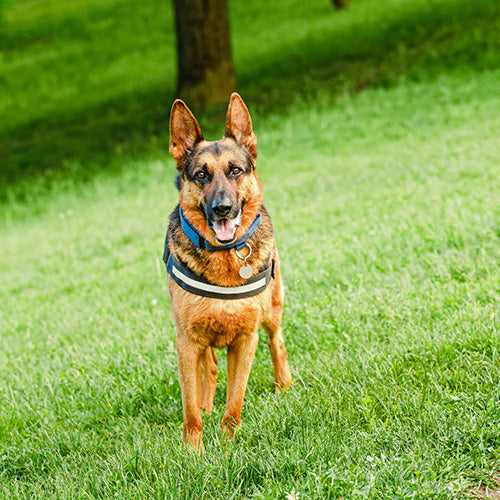It's National Service Dog Awareness Month!
Service dogs are not just pets, they are best friends, pillars of support and, in some cases, life savers. They are committed hard workers who have nothing but loyalty to individuals as their owners. Dogs are selfless, and we should always recognise the light they bring into our lives.

What is a Service dog and what is Service Dog Awareness Month?
A service dog is an animal that has been specially trained to provide assistance to a disabled individual by providing emotional, physical, and/or sensory support. These animals are often referred to as "canine partners" because they work alongside humans.
The most common service dog breeds include Golden Retrievers and Labradors, as well as Poodles, German shepherds, and even miniature horses!
Service Dog Awareness Month is the month of September. It was formerly known as National Guide Dog Month, but was changed to include the range of service dogs there are now.
During September we take time to recognise the huge impact service dogs have on the lives of the humans who depend on them. Children and adults with physical, cognitive, and developmental disabilities are able to live a more comfortable life with the assistance of their service dog
A bit of history
Service dogs, previously referred to as guide dogs, have been used throughout history for assisting the blind. Dating back to the 1750’s, dogs like German shepherds and Poodles were the recommended breeds to train for those who were visually impaired.
In the first World War, dogs were used for their acute sense of smell. Collies were used to find wounded soldiers on the battlefield.
Today, in addition to helping people with visual and hearing impairments, service dogs can assist those with mobility disabilities, epilepsy, diabetes and PTSD. They can also be trained to help a child who has autism learn how to act and react in certain situations. The loyalty and love these dogs give to their owners is truly admirable!

Interestingly, centuries of domestication and evolution has resulted in the domesticated dog with the social-cognitive skills similar to that of young children. That is why dogs can pick up human vocalizations, gesticulations, body language and other behaviours the same way a youngster can.
The human-dog connection
Dating back centuries, humans and dogs, or in the earliest years, wolves, worked together to keep each other safe. Wolves were said to be domesticated around 10,000 to 30,000 years ago. Regardless of the specific time frame, we can gather that it was tens of thousands of years ago that humans realised that dogs were their extra eyes, ears and noses. Dogs could warn humans of danger such as at night-time when humans slept, and they could hunt rabbits and birds more efficiently than humans.
As time has moved on, the potential of dogs as service animals has been realised and built upon. Service dogs today are trained to do specific tasks for their handlers such as fetch objects, support balance, give diabetic or seizure alerts, or assist those with psychiatric disabilities.
These amazing animals provide valuable assistance and companionship to people who really need it. They help people manage their disabilities, giving them the ability and confidence to live a fuller life. Meanwhile, the dog is happy to help their owner who they see as their whole world and purpose.

Service dogs can help individuals cope with emotional and psychological stresses, and sometimes that is all that is needed for a person to get through the day.
What is the difference between a service dog, emotional support dog and a therapy dog?
Trained dogs can provide service to their owners in different ways.
Service dogs are trained to perform certain tasks for the benefit of their owner. Emotional support animals accompany their owners as companions and help them cope with emotional difficulties such as depression or PTSD. It can be by just letting their owner know they are not alone, that service dogs provide the most appreciated support.
Therapy dogs help create the feeling of a safe and relaxed environment for their owners who might be experiencing stress or anxiety. Therapy dogs are also used in care homes or hospitals, as they share their unconditional love with others, which can be a calming experience.

Service animals can help improve the quality of life for those living with disabilities
Service dogs can help people with disabilities be more independent in their daily life, from opening doors to turning on lights.
NOTE!
Always be considerate that a service dog is on the job. Do not try to pet or feed, or give them dog treats unless you've been given permission by the owner.
Conclusion
Service dogs are an important part of many people’s lives, and we hope that by learning more about them, you can help foster a greater understanding of how they affect those who rely on them for assistance. Service dogs provide many individuals with disabilities the support they need to live independently and pursue their goals in life, which is why it’s so important that we use September to recognise how amazing they are!

